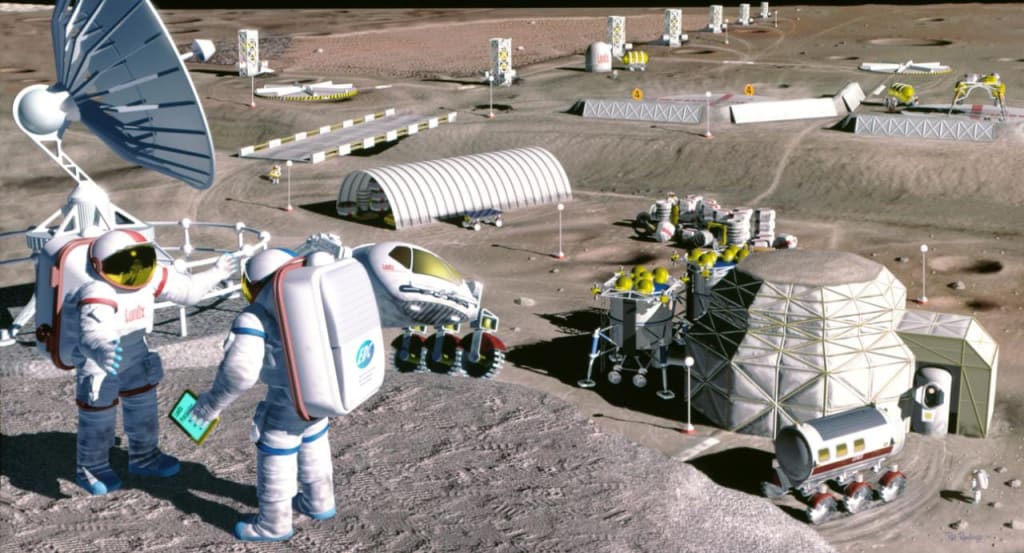Exploring the Final Frontier: The Future of Space Colonization
Overcoming Challenges and Realizing the Benefits of Expanding Beyond Earth

Space exploration and colonization have been a topic of fascination for humans for centuries. From the first successful launch of a rocket in 1926, to the moon landing in 1969, and the Mars rover exploration in recent years, the idea of exploring and colonizing space has been a constant pursuit for humanity. As technology continues to advance, the possibility of space exploration and colonization becomes increasingly achievable, and it may just be the next frontier in human achievement.
The benefits of space exploration and colonization are vast and far-reaching. It could help to advance scientific research and discovery, expand our understanding of the universe, and provide a solution to some of the biggest problems we face on Earth.
One of the primary benefits of space exploration is the advancement of scientific research and discovery. Through the exploration of space, we have already gained a significant amount of knowledge about the universe, including the discovery of new planets, moons, and other celestial objects. The potential for further discovery is limitless, and new breakthroughs in space exploration could lead to advancements in technology and medicine that we could not even imagine.
Another benefit of space exploration is the potential to find solutions to some of the biggest problems we face on Earth. For example, space exploration could help us to better understand climate change and develop new ways to combat it. It could also lead to the discovery of new resources that could be used to solve problems such as food and water shortages.
In addition to the benefits of space exploration, the idea of space colonization also has a number of potential advantages. By colonizing other planets, we could potentially alleviate some of the pressure on Earth's resources, which are becoming increasingly scarce. This could also provide a backup plan in case of a catastrophic event, such as a meteor strike or nuclear war, that could make Earth uninhabitable.
However, the idea of space exploration and colonization also comes with a number of challenges that must be overcome. One of the biggest challenges is the high cost associated with space exploration and colonization. It is estimated that the cost of a manned mission to Mars, for example, could exceed $100 billion. This cost could be prohibitive, particularly given the current economic climate.
Another challenge associated with space exploration and colonization is the potential for long-term health effects on astronauts. Exposure to radiation and prolonged periods of weightlessness can have significant health effects, and these risks must be addressed before any long-term space missions can take place.
Despite these challenges, the potential benefits of space exploration and colonization are too great to ignore. As technology continues to advance, the possibility of space exploration and colonization becomes increasingly achievable. Private companies such as SpaceX and Blue Origin are already making significant strides in space exploration, and NASA and other space agencies are continuing to invest in research and development.
One of the most promising areas of research in space exploration and colonization is the development of new propulsion systems that could significantly reduce the cost and time required for space travel. One example of this is the development of ion thrusters, which use electricity to accelerate ions and create thrust. Ion thrusters are much more efficient than traditional chemical rockets, and could significantly reduce the cost and time required for space travel.
Another area of research is the development of new materials that could be used to construct spacecraft and space habitats. For example, researchers are currently exploring the use of 3D printing to create structures using materials found on other planets, such as Martian soil. This could significantly reduce the cost and complexity of building space habitats.
In conclusion, space exploration and colonization represent the next frontier in human achievement. The potential benefits of space exploration and colonization are vast and far-reaching, from the advancement of scientific research and discovery, to the potential solutions to some of the biggest problems we face on Earth. While there are significant challenges associated with space exploration and colonization, the advancements in technology and research mean that we are now closer than ever to making it a reality. With private companies and space agencies continuing to invest in research and development, the future of space exploration and colonization is looking increasingly promising.
One of the most exciting developments in space exploration is the increasing interest in commercial space travel. Companies such as Virgin Galactic and SpaceX are already offering commercial space flights, and this could open up a whole new era of space exploration and colonization. Commercial space travel could potentially make space exploration more accessible and affordable, which could lead to significant advancements in the field.
However, there are still significant hurdles to overcome before space exploration and colonization can become a reality. One of the biggest challenges is the potential impact on the environment. The exploration and colonization of other planets could have a significant impact on the local ecosystems and environments, and this must be taken into account before any missions take place.
Another challenge is the potential for conflict over resources. As space exploration and colonization become more feasible, there may be competition over resources such as water and minerals, which could lead to conflicts between nations or companies. This is an issue that must be addressed in order to ensure that space exploration and colonization are conducted in a responsible and sustainable way.
Despite these challenges, the potential benefits of space exploration and colonization are too great to ignore. The exploration and colonization of other planets could provide solutions to some of the biggest problems we face on Earth, and could help to advance scientific research and discovery. With the advancements in technology and research, and the increasing interest in commercial space travel, it is likely that space exploration and colonization will continue to be a major focus for humanity in the coming years and decades.
In conclusion, space exploration and colonization represent the next frontier in human achievement. While there are significant challenges associated with space exploration and colonization, the potential benefits are vast and far-reaching. As technology continues to advance and private companies and space agencies invest in research and development, it is likely that we will continue to make significant strides in space exploration and colonization in the coming years and decades. It is up to us to ensure that we approach this field in a responsible and sustainable way, in order to unlock the full potential of space exploration and colonization for generations to come.
About the Creator
shankar jadhav
delivering quality content. I have a keen eye for detail, and my writing style is both engaging and informative. I have a strong background in research, and I am always looking for new and interesting topics to write about.






Comments
There are no comments for this story
Be the first to respond and start the conversation.